

- A sárvidékeken nemhogy a mentő nem ér oda 15 percen belül egy infarktusos beteghez, ennyi idő alatt még egy traktort sem könnyű találni, amely behúzná a beteghez a rohamkocsit. // A tractor stuck in mud at the “Large Lawn”, the former Lenin settlement in Csanytelek. Years ago they spent 6500 Euros on the design, permits and application required for preparing the renovation of three dirt streets of Csanytelek in particularly bad condition. The local government did not win the grant, because they failed to provide traffic count data and accident statistics to prove the need for a pavement. It is impossible to provide high traffic data to justify the necessity of renovating a road that is impassable during most of the year; nor do hay carts ever collide on a street where even jeeps get stuck.
- Kiss István 50 ezer forintos rokkant nyugdíjból él Pálmonostora közelében lévő tanyáján. // István Kiss in his home that is surrounded by dirt roads in Tömörkény. His disability pension is 140 Euros. István passed away last year.
- János lova Tömörkény határában // János’s horse stands on the outskirts of Tömörkény.
- József és felesége tiszaföldvári kunyhójuknál. //József and his wife in front of their hut. The pair built an own hut after many years of the homelessness in Tiszaföldvár.
- Kovács Lajos konyhájának fala Csanyteleken. A legtöbb “sárvidéken” élőnek súlyos problémát jelent a lakás vagy a ház fenntartása. // The wall of Lajos Kovács’ house. Most of those living in “Mud Country” have great difficulties maintaining their house.
- A 86 éves Sebő Anna 58 éve él csanyteleki otthonában. Unokái már évek óta külföldön élnek. // Anna Sebők walks in front of her house at Csanytelek. She has been living here for the past 58 years. The majority of the youth move to nearby cities as soon as they can, resulting in a relatively high number of people living alone in “Mud Country”.
- Régi sírkövek a Csanytelek temetőben. // Old gravestones stand near the cemetery of Csanytelek.
- Luca édesanyjával és nagyapjával csanyteleki házukban Csongrád megyében, ahol öt bátyjával és a szülőkkel élnek. A legfrisebb adatok szerint a kisgyerekek közel negyede szegénységben él Magyarországon. // Luca lives with her mother and grandfather in their home in Csanytelek, Csongrád County together with her five brothers. According to the latest data almost quarter of young children live in poverty in Hungary.
- A földutak mentén élők szerint minden tönkremegy a sárban. A ház, az autó, a biciklik, de még a lábbelik is. // People living along the dirty roads say everything gets destroyed in the mud. The house, the car, the bikes and even the footwear.
- A Csongrád megyei Csanyteleken a lakosság 30 százaléka él földutak mellett. A nehezen megközelíthető helyeken jellemzően a szegényebb emberek laknak. // At Csanytelek, in county Csongrád 35 per cent of the population lives along dirt roads. The village struggles with migration and the spread of poverty.
- Vasárnapi ebéd a Borsos családnál. // Weekend lunch at the Borsos family. The family must spend almost all their income on food and on raising the children, covering their most basic needs.
- János kutyájával csanyteleki otthona előterében. // Janos poses with his dog at his farm in Csanytelek, Csongrád country. For the people who live along and near dirts road mud is a constant problem, just as well walking and getting around in mud.
- Kevés család engedhet meg magának haszonállatokat. // Only a few families of “Mud Country” can afford to have livestock.
- Kovács Lajos házának előterében válogatja a fémhulladékként eladni szánt matracok rugóit Csanyteleken. A település nemcsak az elszegényedéssel, a földutak okozta problémákkal is küzd. // Lajos Kovács of Csanytelek at the forefront of his house, selecting springs of mattresses for selling them as metal waste. Besides poverty the village struggles with the inconvenience of dirt roads.
- Esős évben nemcsak a sár, de a feltörő belvíz is sújtja a földutak mentén élőket. // Damage caused by inland waters on the wall of the Darnai family’s house.
- A 15 éves Zsolti édesapja tanyájának közelében, a Tömörkény melletti tanyavilágban. // The 15-year-old Zsolt poses at his father’s farm near a farm settlement, Tomorkeny.
- Ilona közmunkás, a család másik bevétele a férje 50 ezer forintos rokkantnyugdíja. A szegények nagy részének nem adatik meg, hogy a munkájából éljen. Az idő múlásával válik a helyzetük kilátástalanná. // Ilona is a public worker. The only other source of income for their family is her husband’s invalidity benefits of 145 Euros per month. Living on a paid job is almost impossible and eventually seems beyond hope for most of the poor. Ilona passed away last year.
- Özvegy Bende Balázsné és a kislánya, Nórika olyan tanyában él, amelyhez egy agyagból épült gátszakasz mentén lehet eljutni. // Widowed Balázsne Bende and her daughter Nórika live on a farm, which you can get to along an embankment built from clay.
- Az elpusztult bárányokat legtöbbször a pásztorkutyák kapják meg a tanyákon. // The shepherd dogs usually get to eat the dead lambs on the farmlands of Tomorkeny.
- Bende Balázsné csanyteleki, földutak menti otthonában. Máriának évekkel ezelőtt halt meg a férje. Közösen vették a tanyát, hitelből, a rokkantnyugdíjas asszony azóta egyedül törleszti a részleteket. // Mária Veres, in her home that is surrounded by dirt roads. Mária’s husband died years ago. They bought the farm together on loans and ever since then the retired disable woman pays the mortgage alone.
- Elhagyott ház Csanytelek egyik utcájában. // Abandoned house at Csanytelek, Csongrád county. There are an increased number of abandoned buildings in “Mud Country” that after a time become one with nature.
- Kovács Lajos nyugdíjas, házának egyetlen, pár négyzetméteres szobájában. // The retired Lajos Kovács is sitting in the only small room of his house.
- Hagyományos disznóvágás Csanyteleken. // Pig slaughter at Csanytelek. Pig slaughter is an old tradition in Eastern Europe and it is still a frequent event in the countryside in winter.
- Pálinkát fogyasztó vendég a Borsos családnál. Az alkohol komoly probléma Magyarországon, 10 millió lakosból 800 ezer alkoholista. Az úgynevezett nagyivók száma pedig eléri a 2 és fél milliót. // Guest is having a drink of pálinka (Hungarian spirit) at the Borsos’ house. Alcohol consumption is a serious problem in Hungary, 800 thousand people of the population of 10 million is affected by alcohol dependence. The number of so-called dedicated drinkers may reach 2,5 million.
- Hatméteres világító kereszt a Csongrád megyei Baks községben. // A six-meter high illuminated cross in the village of Baks in Csongrád County.
- A 73 éves Bozó József egy általa átalakított Volvo buszban él háromhektáros tömörkényi birtokán. Évekkel ezelőtt mindenét pénzzé tette egy honfoglalás korabeli falut tervezésére, de senki sem támogatta az ötletét. // József Bozó, aged 72 lives on his own 3-acre land in Tömörkény, in a Volvo bus modified by himself. He sold all of his belongings several years ago, planning to erect a village resembling the ancient era of the Hungarian conquest, but his idea was not subsidized.
- Emu egy csanyteleki farmon. // Emu at an farm in Csanytelek.
- A szegénység nem akadály, hogy a gyerekek otthon is kellő kreativitással játszanak. // Poverty is no obstacle for playing creatively at home.
- Csanytelek, 2020
- A 7 hónapos Patkó Erika családja tömörkényi otthonában. // The seven-month-old Erika Patkó lies in her family’s living room at their home in Tömörkény.
- A Vida család nappalijának fala Tömörkényben. // The wall of Vida family’s’ living room in Tömörkény.
- A közösségi oldalak és a telefon ugyanúgy meghatározó a helyi gyerekek életében, mint a jobb módban élőknek. // Social networking and the mobile phone are just as essential in the boys’ lives as in those of the most privileged ones.
- Fekete Ferenc juhász egy elhagyott kisvasút sín mellett a tömörkényi horgásztavaknál. // Ferenc Juhász shepherd standing along an abandoned railway-track near the fishing lake of Tömörkény.
- A 86 eves Sebő Anna otthonában // Anna Sebő, aged 86 has lived in her home of Csanytelek for 58 years. Her grandchildren moved abroad years ago. The majority of the youth move to nearby cities as soon as they can, resulting in a relatively high number of people living alone in Hungary.
- Szénabálák pihennek a csanyteleki volt Lenin telep melletti mezőn // Hay bales rest in a field at the former Lenin settlement in Csanytelek.
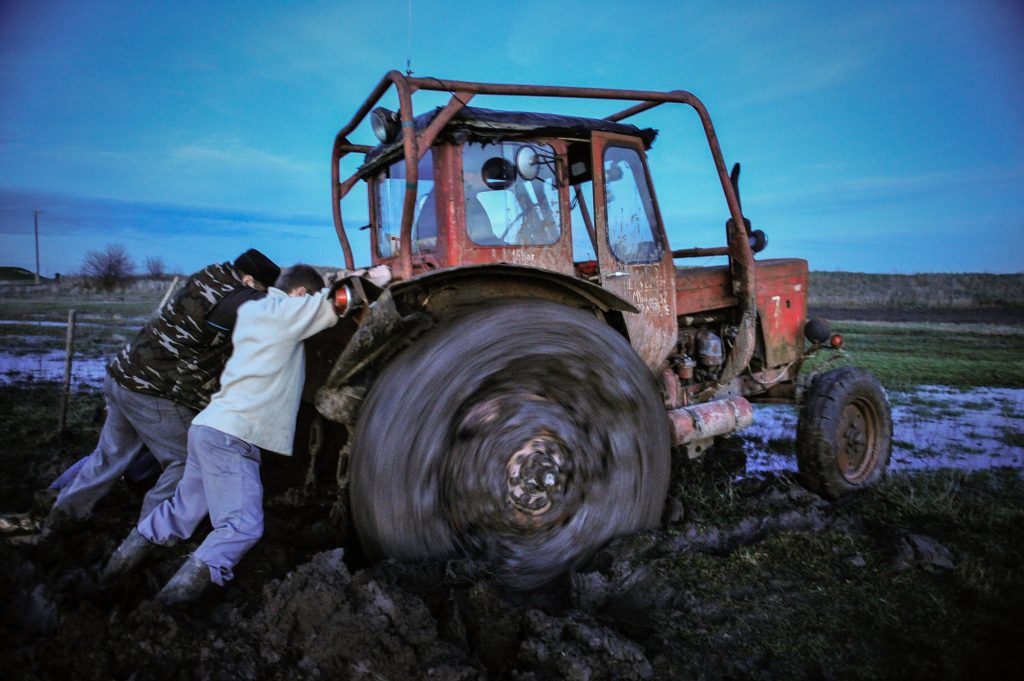
A tractor stuck in mud at the "Large Lawn", the former Lenin settlement in Csanytelek. Years ago they spent 6500 Euros on the design, permits and application required for preparing the renovation of three dirt streets of Csanytelek in particularly bad condition. The local government did not win the grant, because they failed to provide traffic count data and accident statistics to prove the need for a pavement. It is impossible to provide high traffic data to justify the necessity of renovating a road that is impassable during most of the year; nor do hay carts ever collide on a street where even jeeps get stuck.
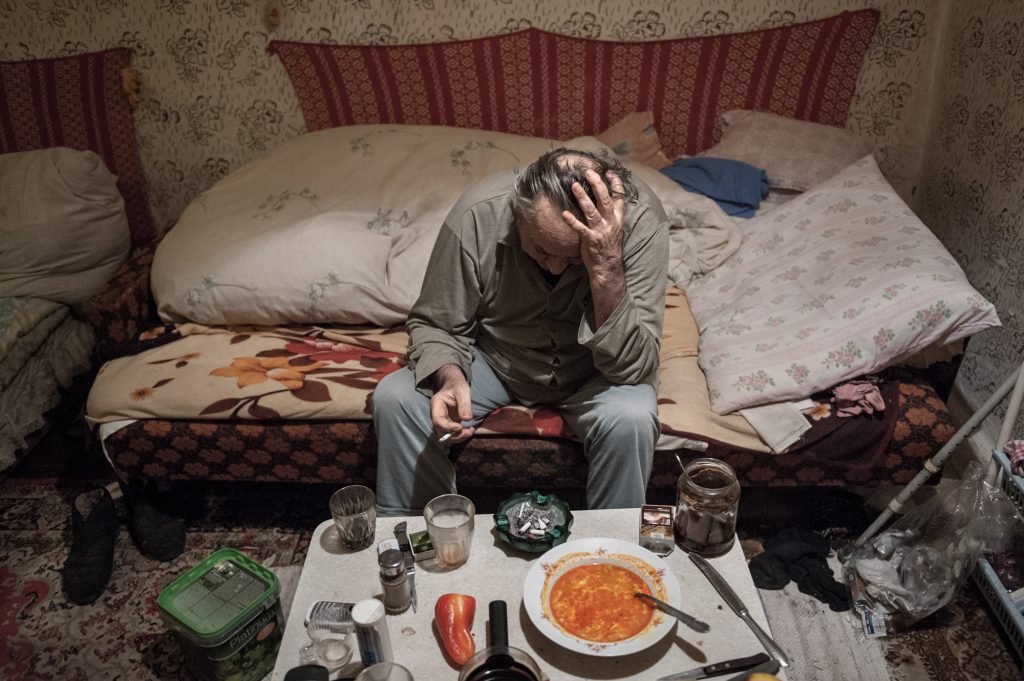
István Kiss in his home that is surrounded by dirt roads in Tömörkény. His disability pension is 140 Euros. István passed away last year.
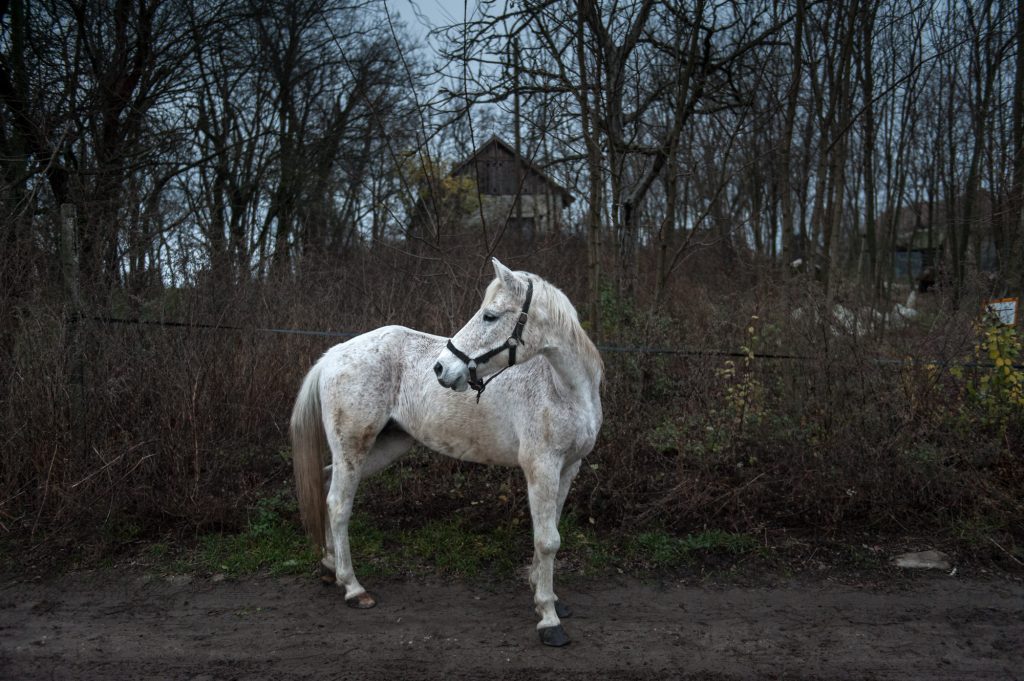
János's horse stands on the outskirts of Tömörkény.
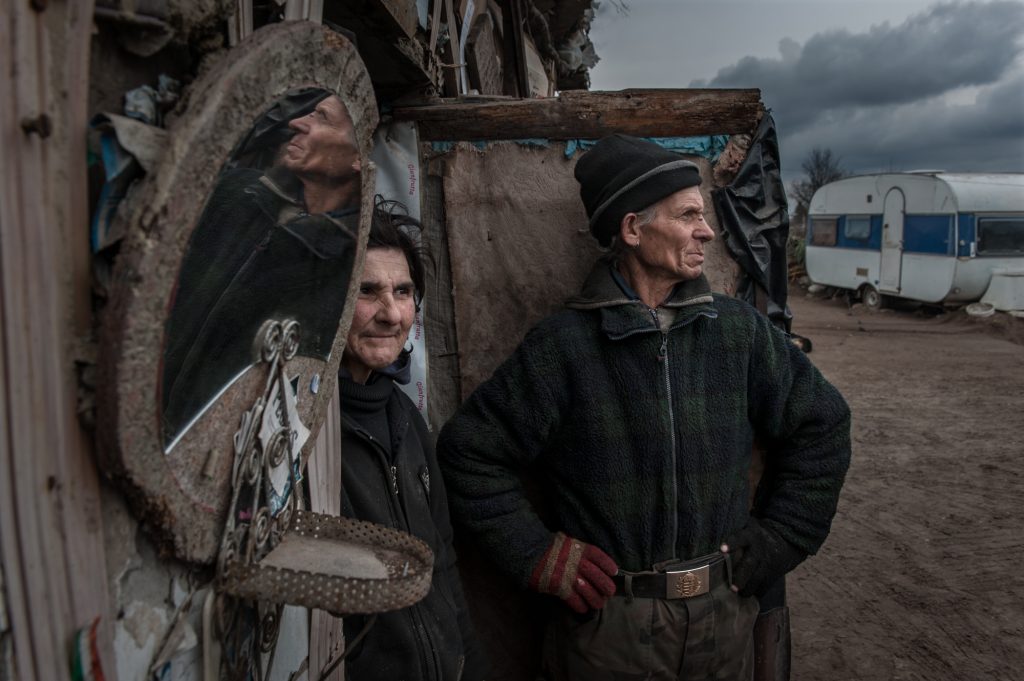
József and his wife in front of their hut. The pair built an own hut after many years of the homelessness in Tiszaföldvár.
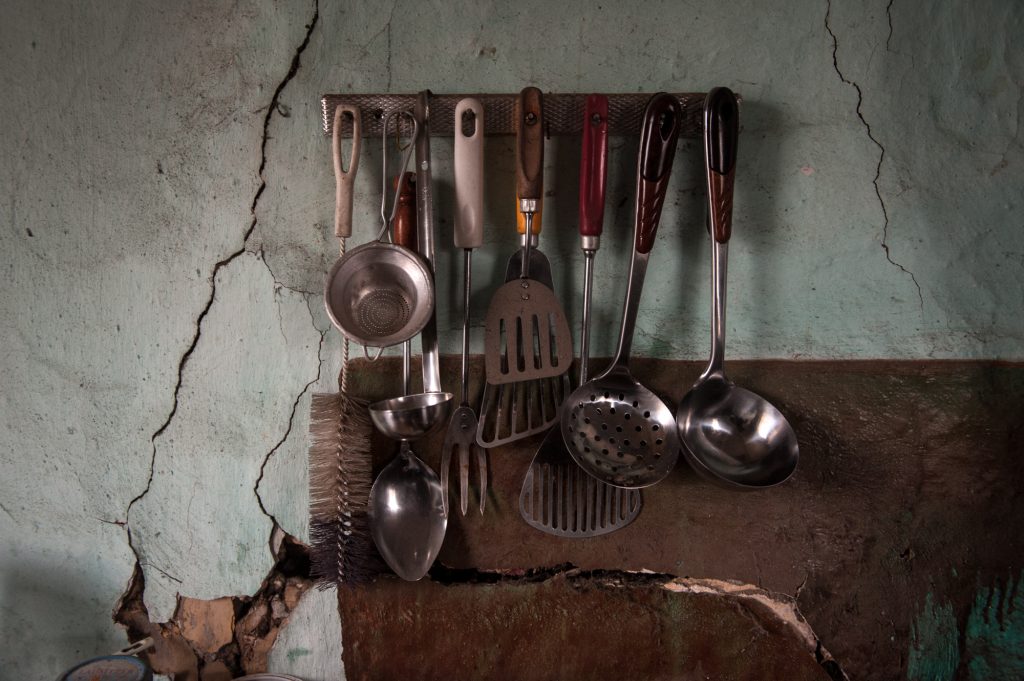
The wall of Lajos Kovács’ house. Most of those living in “Mud Country” have great difficulties maintaining their house.
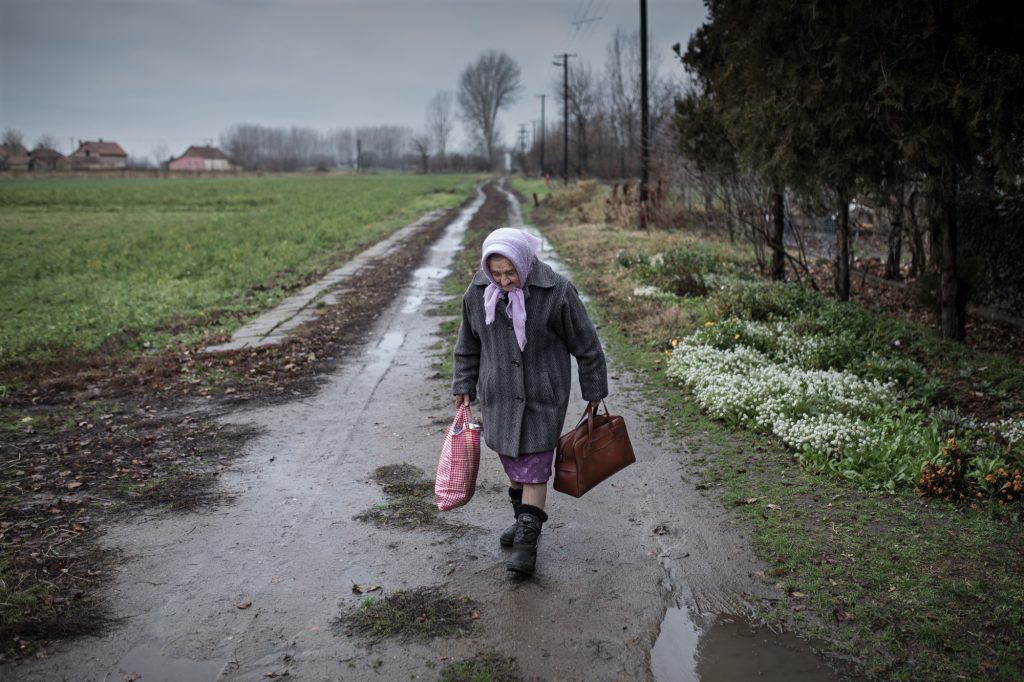
Anna Sebők walks in front of her house at Csanytelek. She has been living here for the past 58 years. The majority of the youth move to nearby cities as soon as they can, resulting in a relatively high number of people living alone in “Mud Country”.
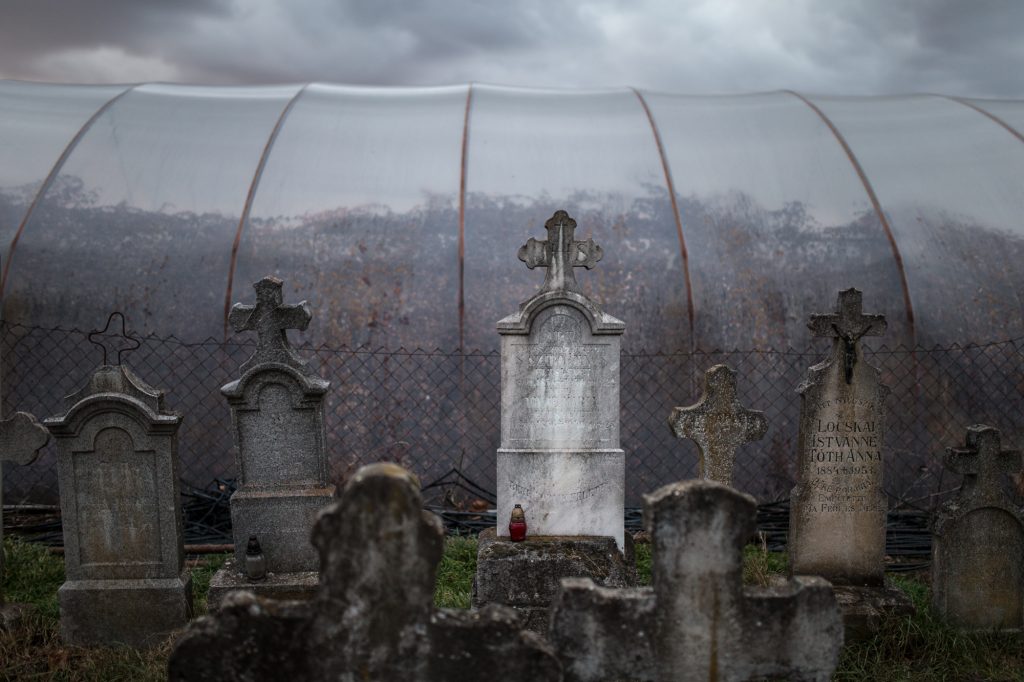
Old gravestones stand near the cemetery of Csanytelek.
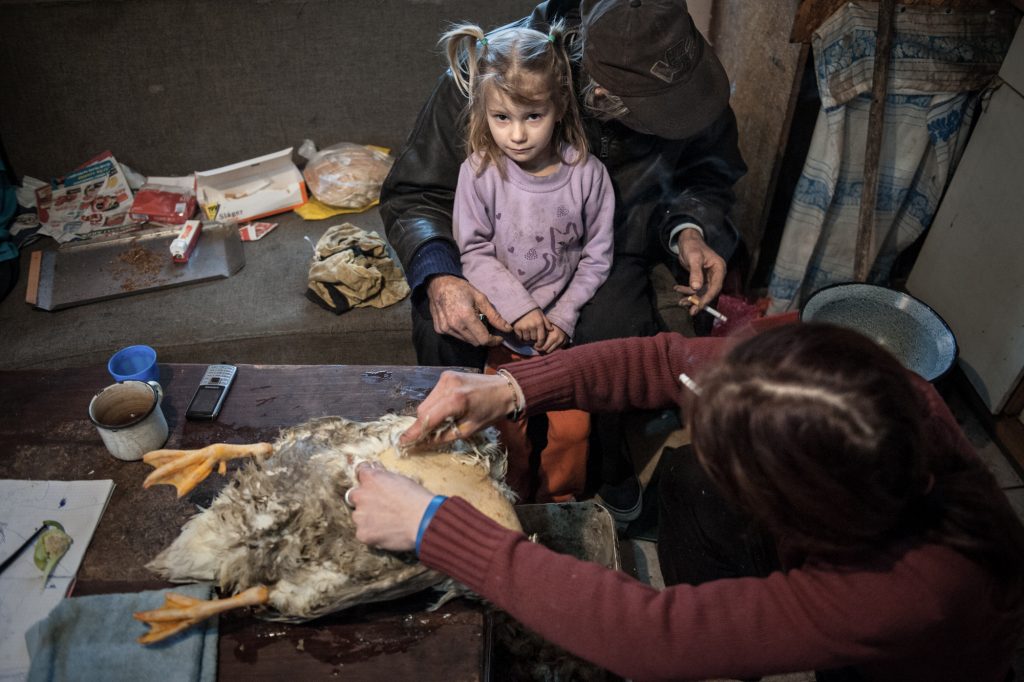
Luca lives with her mother and grandfather in their home in Csanytelek, Csongrád County together with her five brothers. According to the latest data almost quarter of young children live in poverty in Hungary.
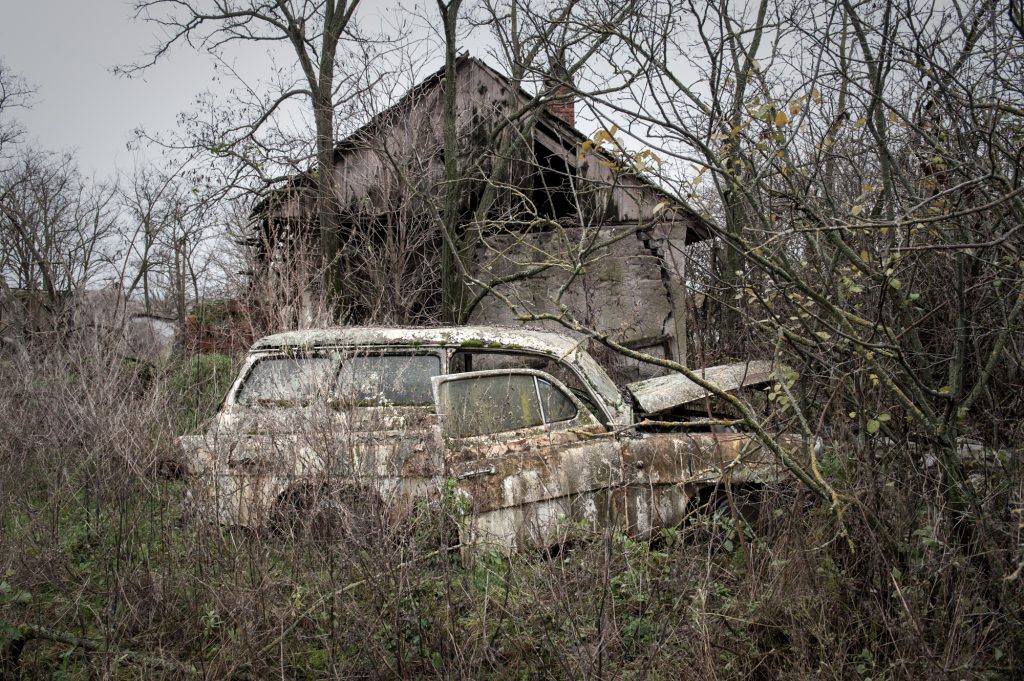
People living along the dirty roads say everything gets destroyed in the mud. The house, the car, the bikes and even the footwear.
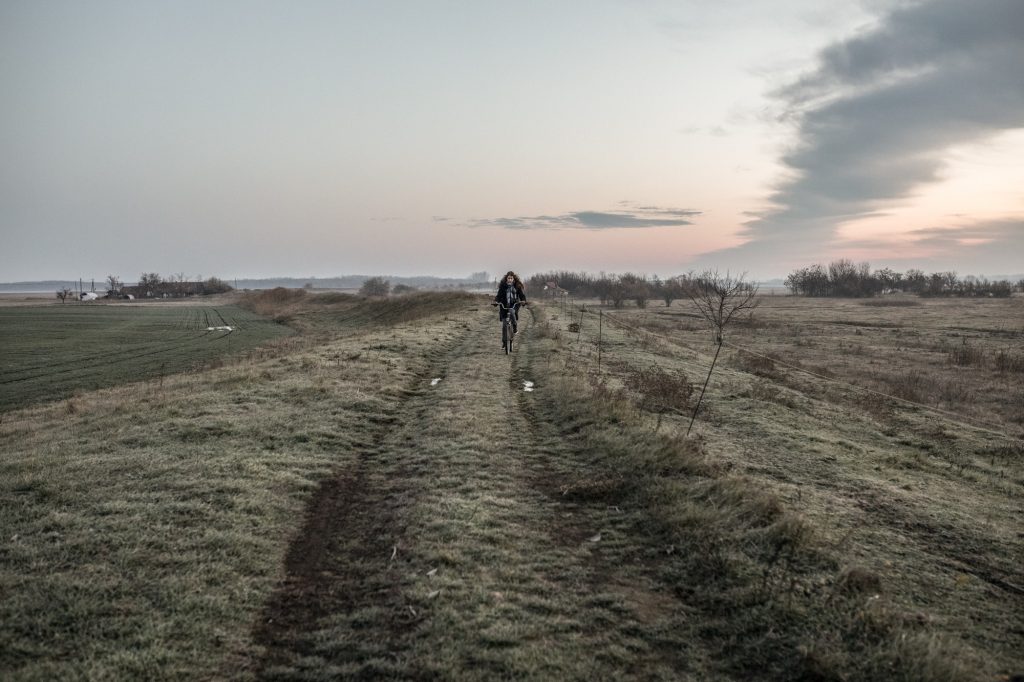
At Csanytelek, in county Csongrád 35 per cent of the population lives along dirt roads. The village struggles with migration and the spread of poverty.
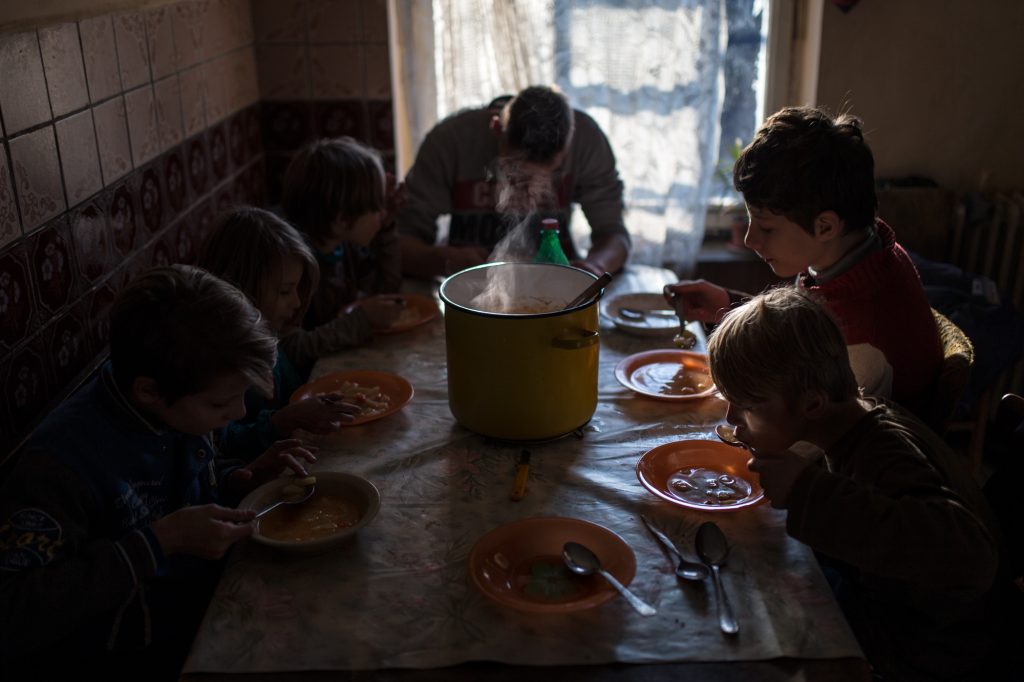
Weekend lunch at the Borsos family. The family must spend almost all their income on food and on raising the children, covering their most basic needs.
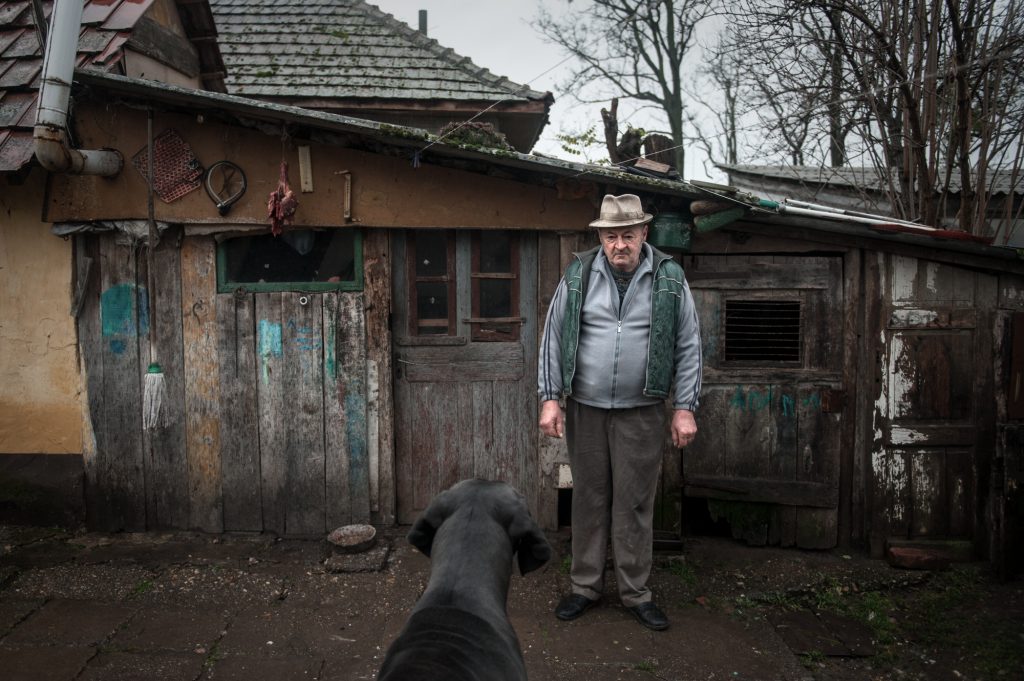
Janos poses with his dog at his farm in Csanytelek, Csongrád country. For the people who live along and near dirts road mud is a constant problem, just as well walking and getting around in mud.
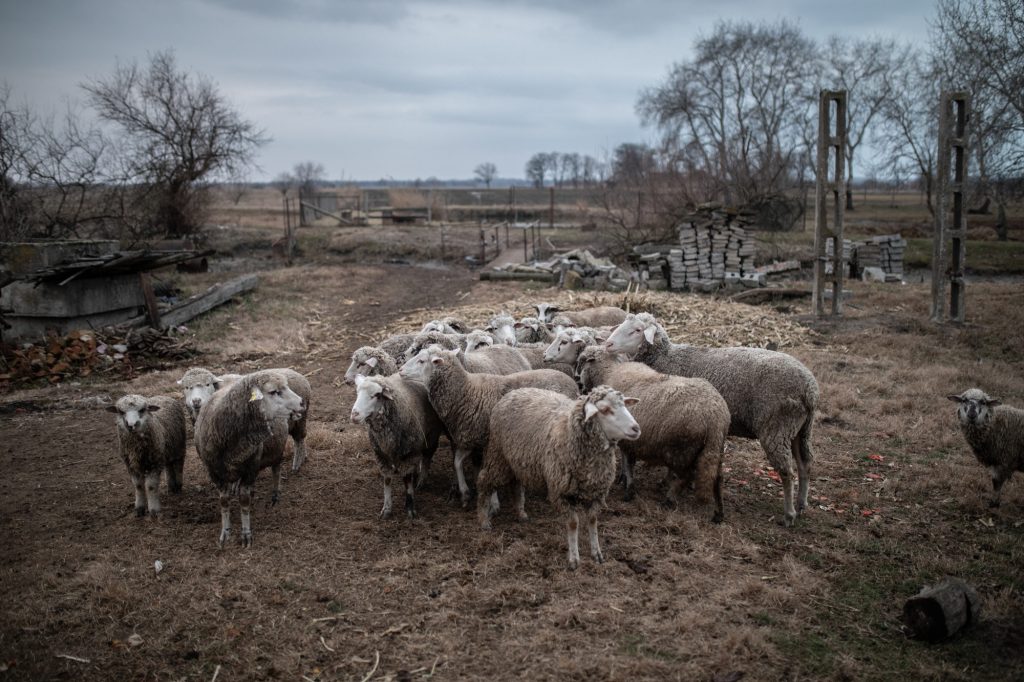
Only a few families of “Mud Country” can afford to have livestock.
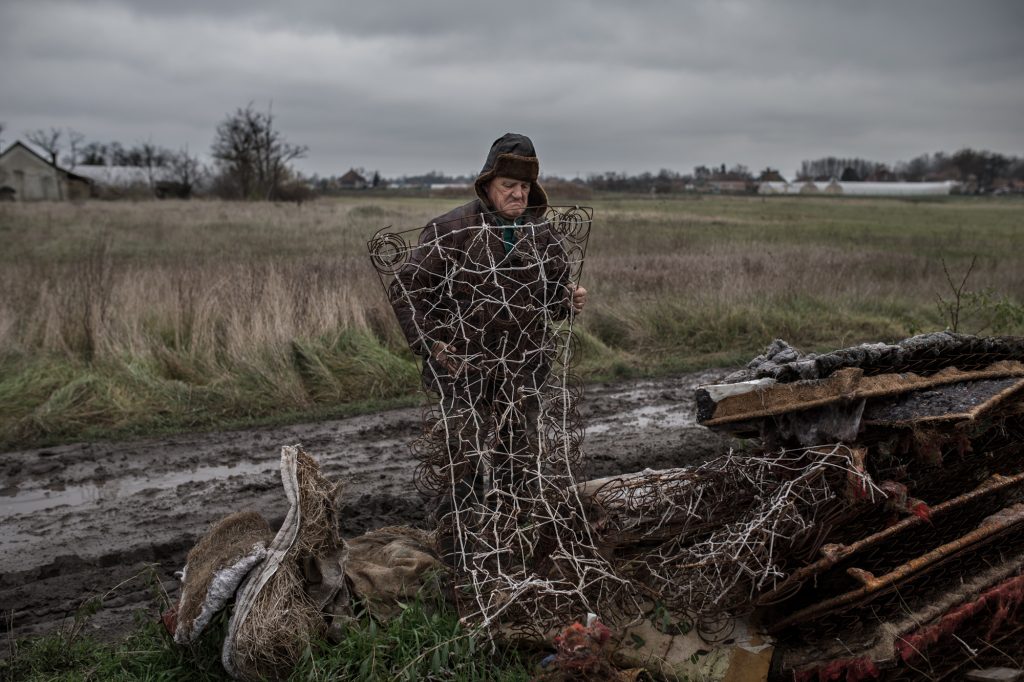
Lajos Kovács of Csanytelek at the forefront of his house, selecting springs of mattresses for selling them as metal waste. Besides poverty the village struggles with the inconvenience of dirt roads.
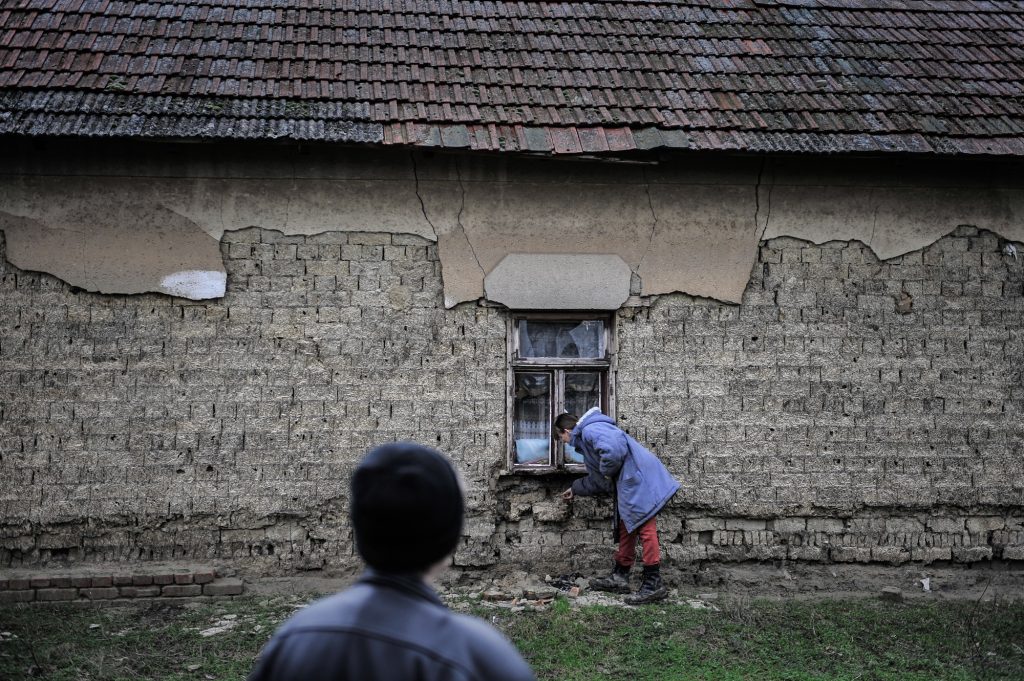
Damage caused by inland waters on the wall of the Darnai family’s house.
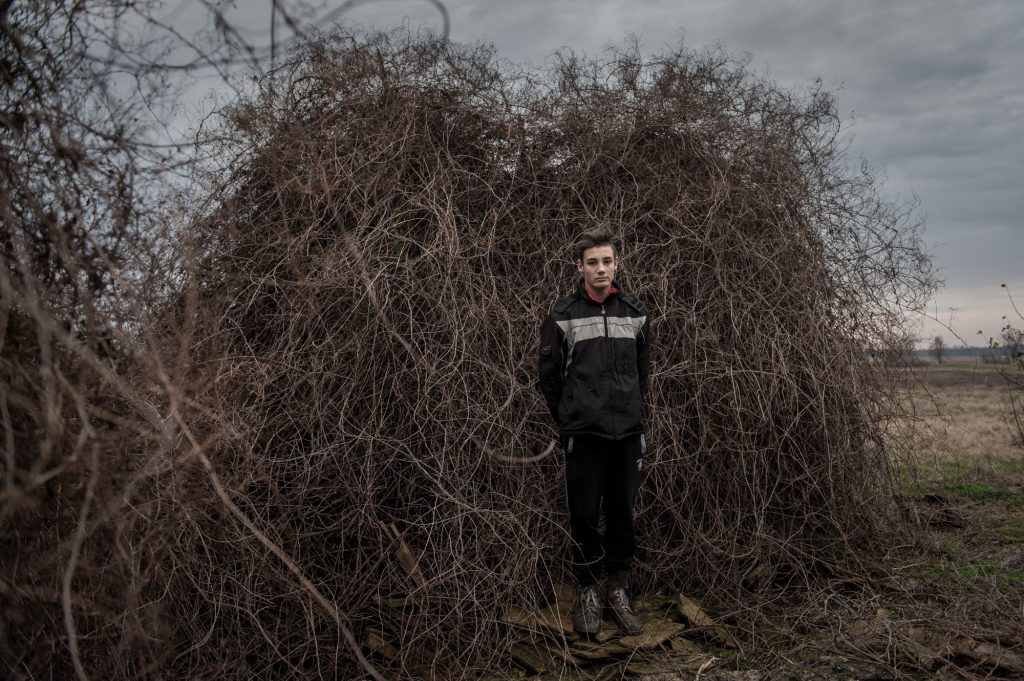
The 15-year-old Zsolt poses at his father’s farm near a farm settlement, Tomorkeny.
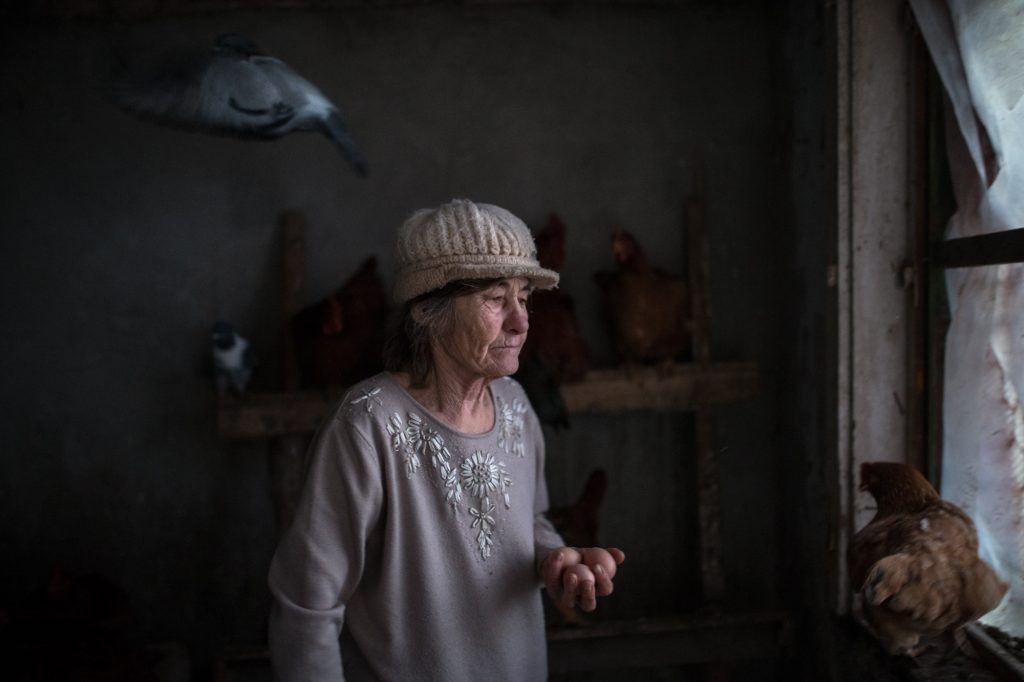
Ilona is a public worker. The only other source of income for their family is her husband’s invalidity benefits of 145 Euros per month. Living on a paid job is almost impossible and eventually seems beyond hope for most of the poor. Ilona passed away last year.
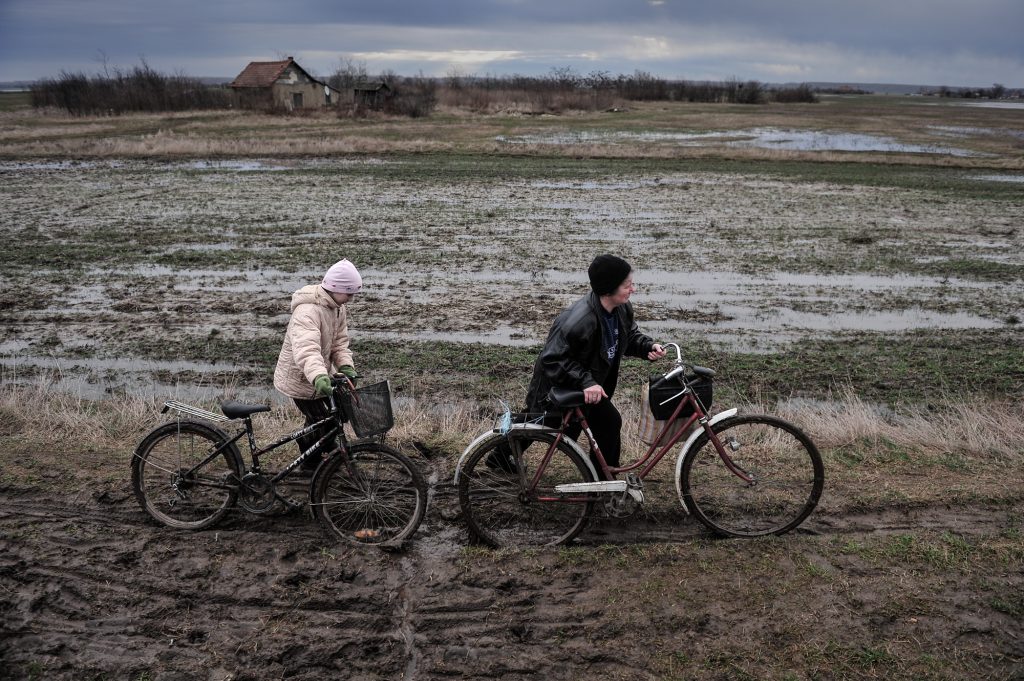
Widowed Balázsne Bende and her daughter Nórika live on a farm, which you can get to along an embankment built from clay.
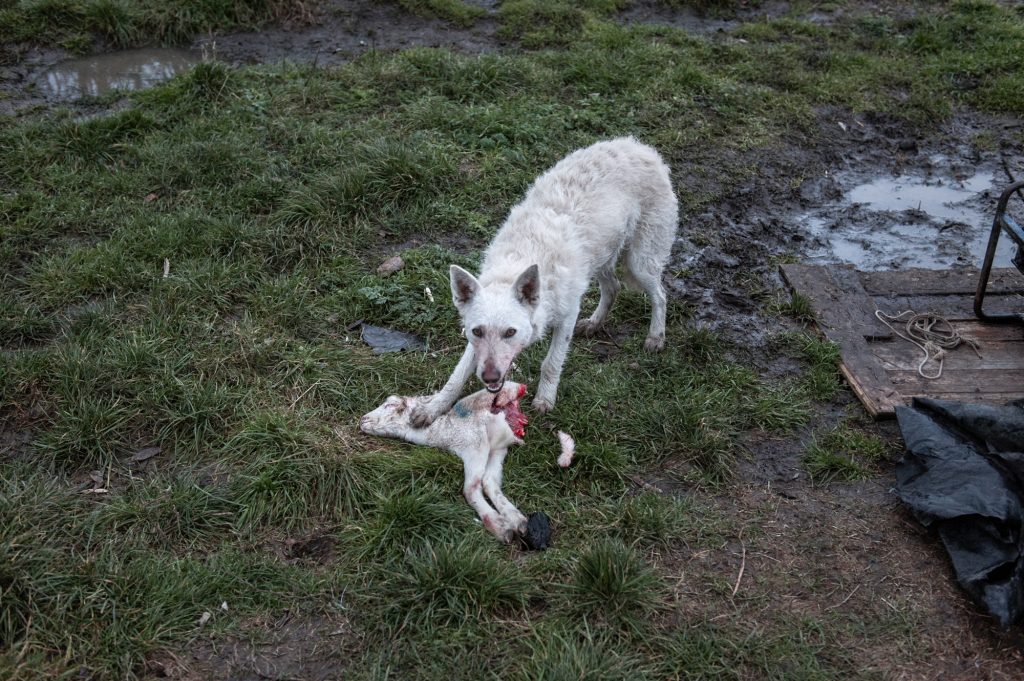
The shepherd dogs usually get to eat the dead lambs on the farmlands of Tomorkeny.

Mária Veres, in her home that is surrounded by dirt roads. Mária’s husband died years ago. They bought the farm together on loans and ever since then the retired disable woman pays the mortgage alone.
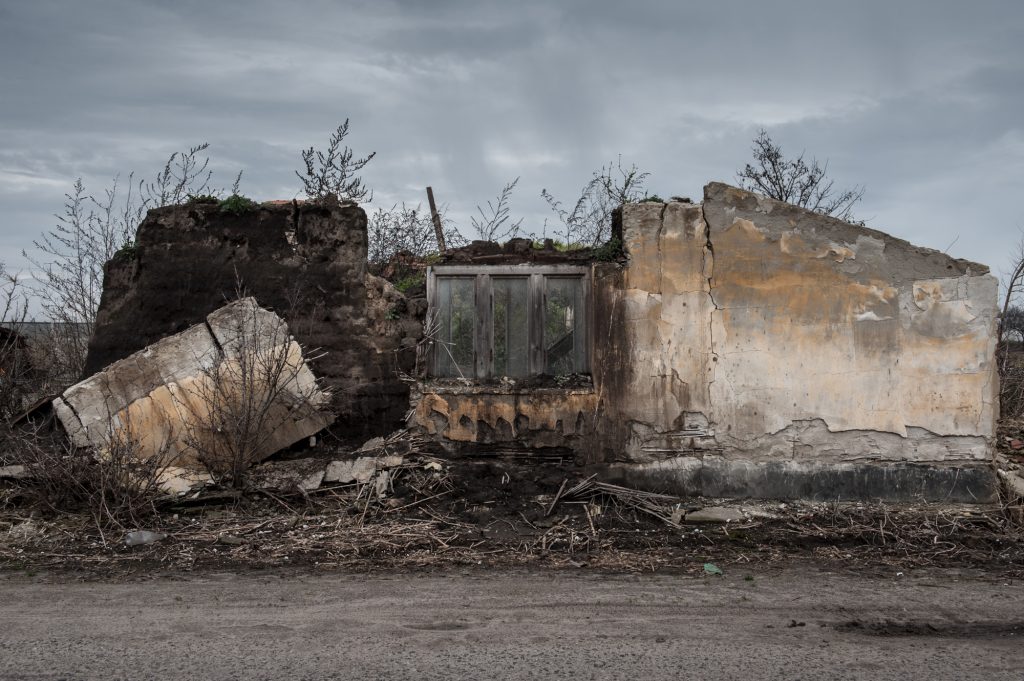
Abandoned house at Csanytelek, Csongrád county. There are an increased number of abandoned buildings in "Mud Country" that after a time become one with nature.
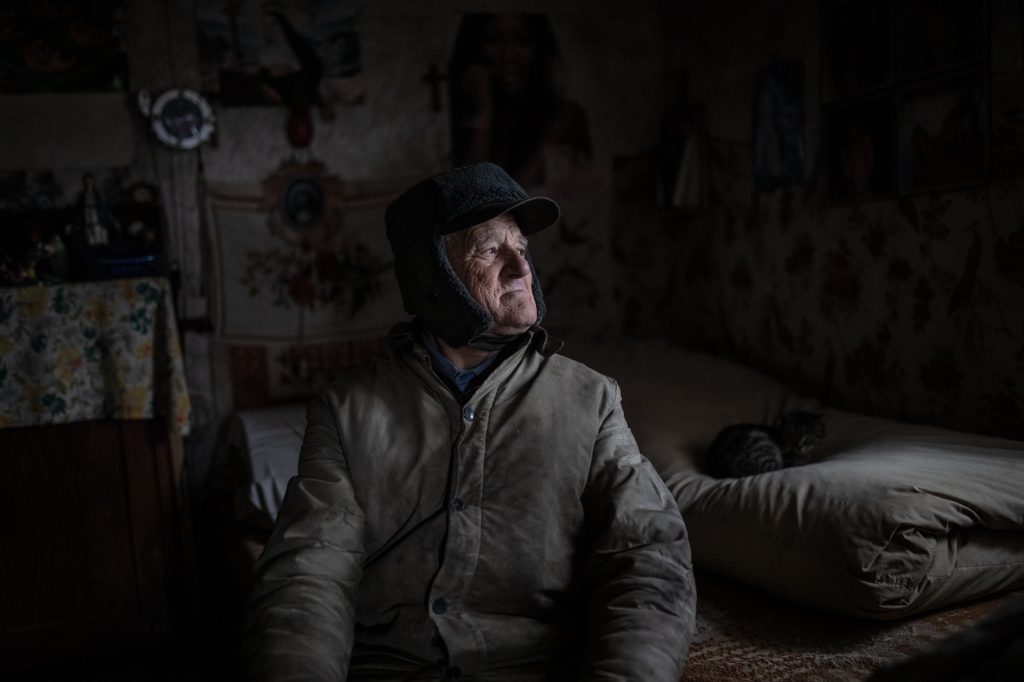
The retired Lajos Kovács is sitting in the only small room of his house.
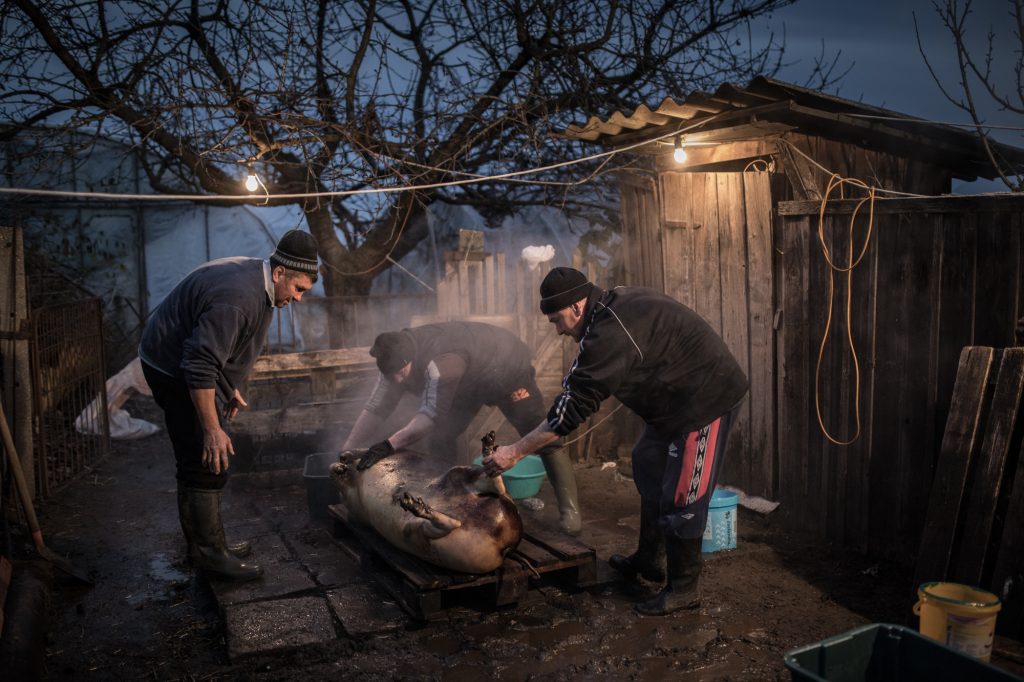
Pig slaughter at Csanytelek. Pig slaughter is an old tradition in Eastern Europe and it is still a frequent event in the countryside in winter.
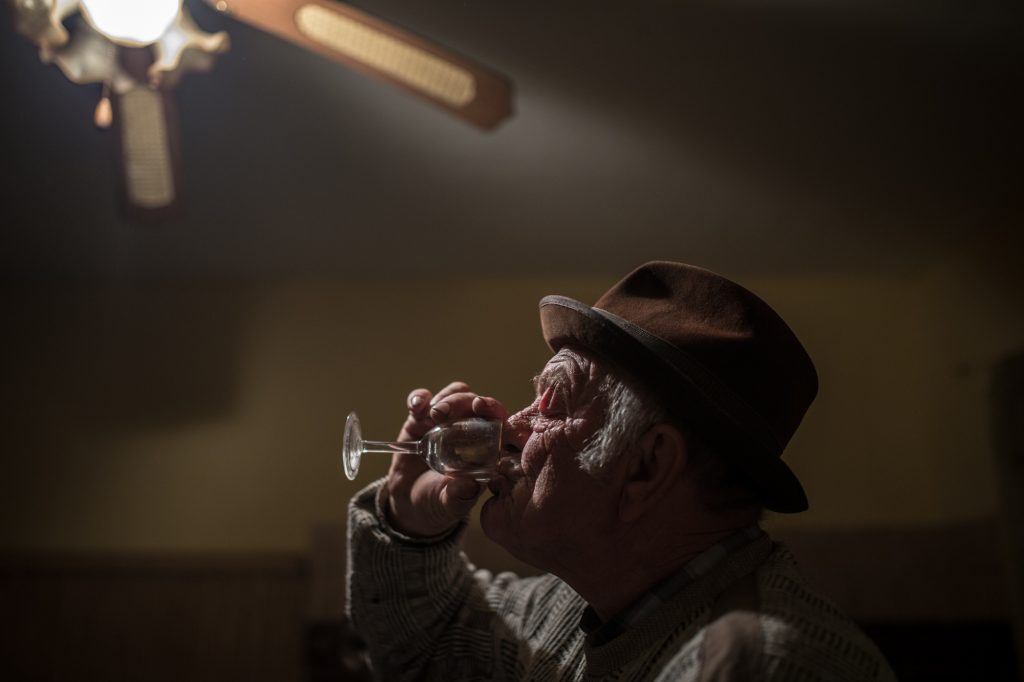
Guest is having a drink of pálinka (Hungarian spirit) at the Borsos’ house. Alcohol consumption is a serious problem in Hungary, 800 thousand people of the population of 10 million is affected by alcohol dependence. The number of so-called dedicated drinkers may reach 2,5 million.
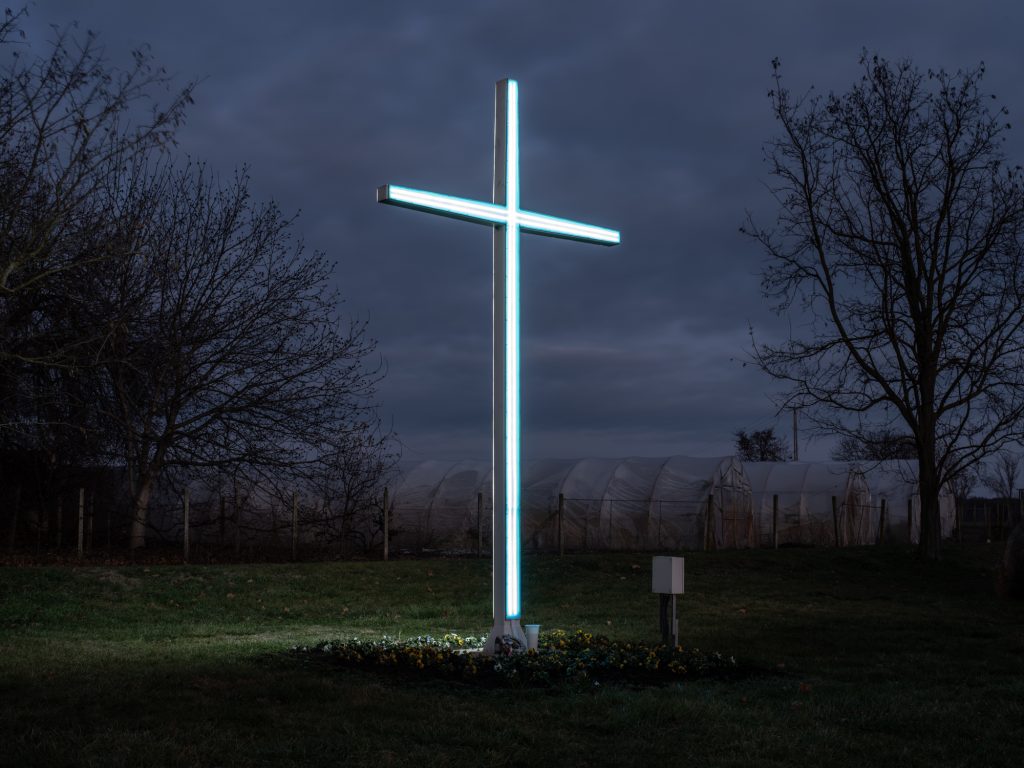
A six-meter high illuminated cross in the village of Baks in Csongrád County.
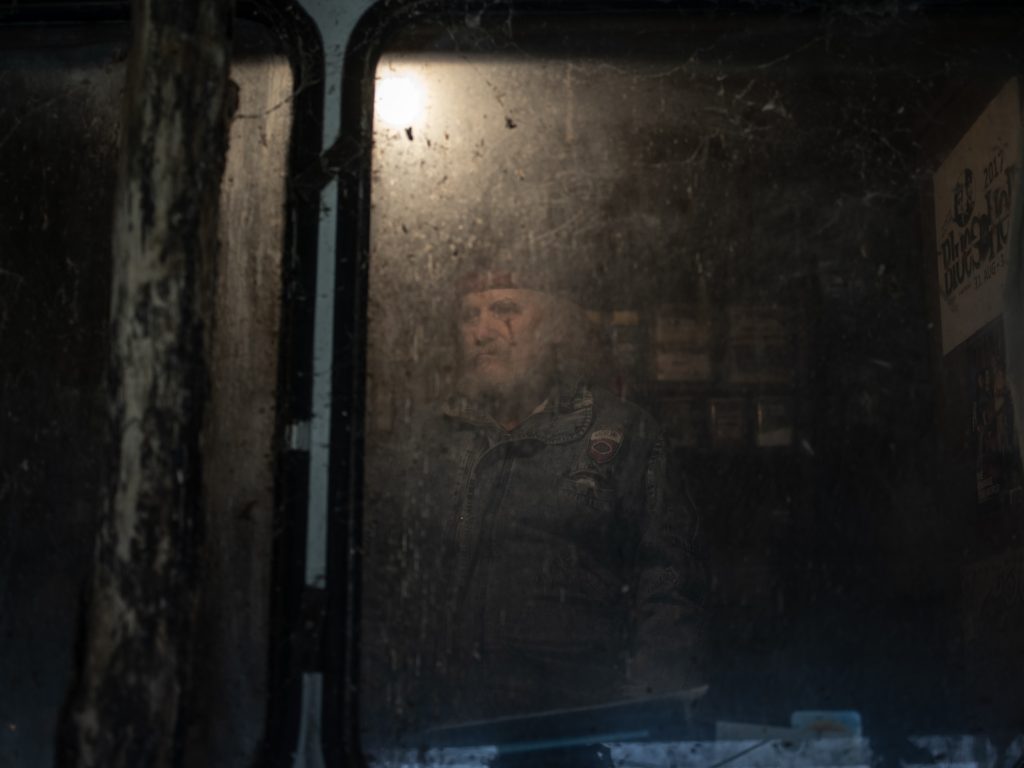
József Bozó, aged 72 lives on his own 3-acre land in Tömörkény, in a Volvo bus modified by himself. He sold all of his belongings several years ago, planning to erect a village resembling the ancient era of the Hungarian conquest, but his idea was not subsidized.
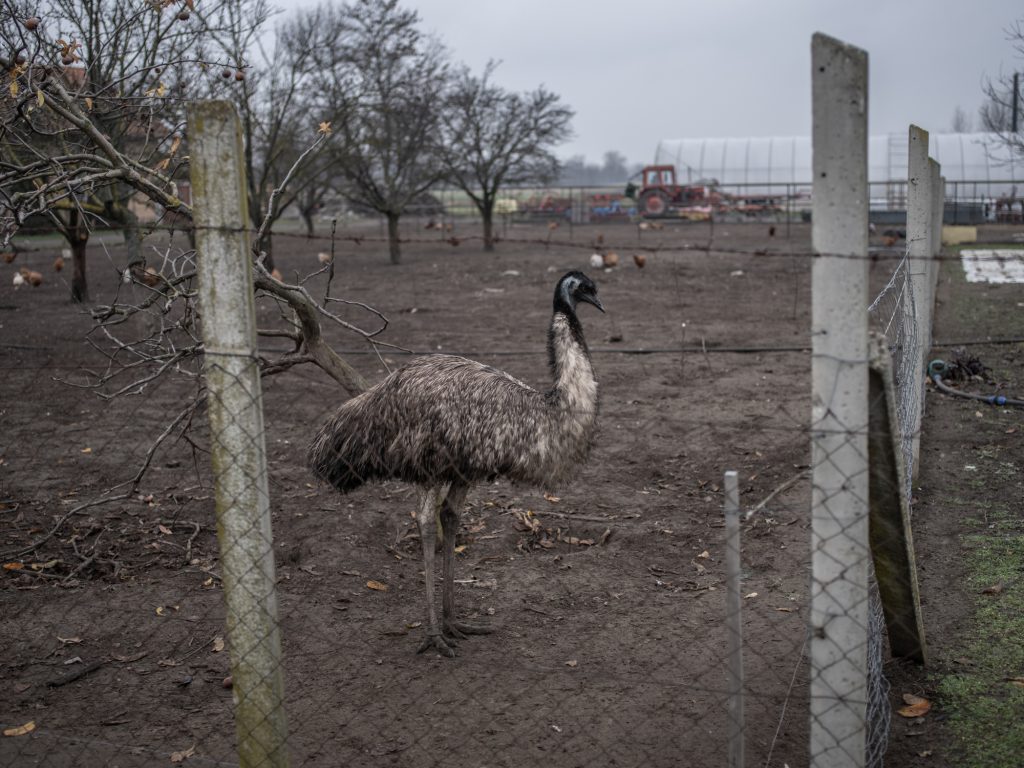
Emu at an farm in Csanytelek.

Poverty is no obstacle for playing creatively at home.
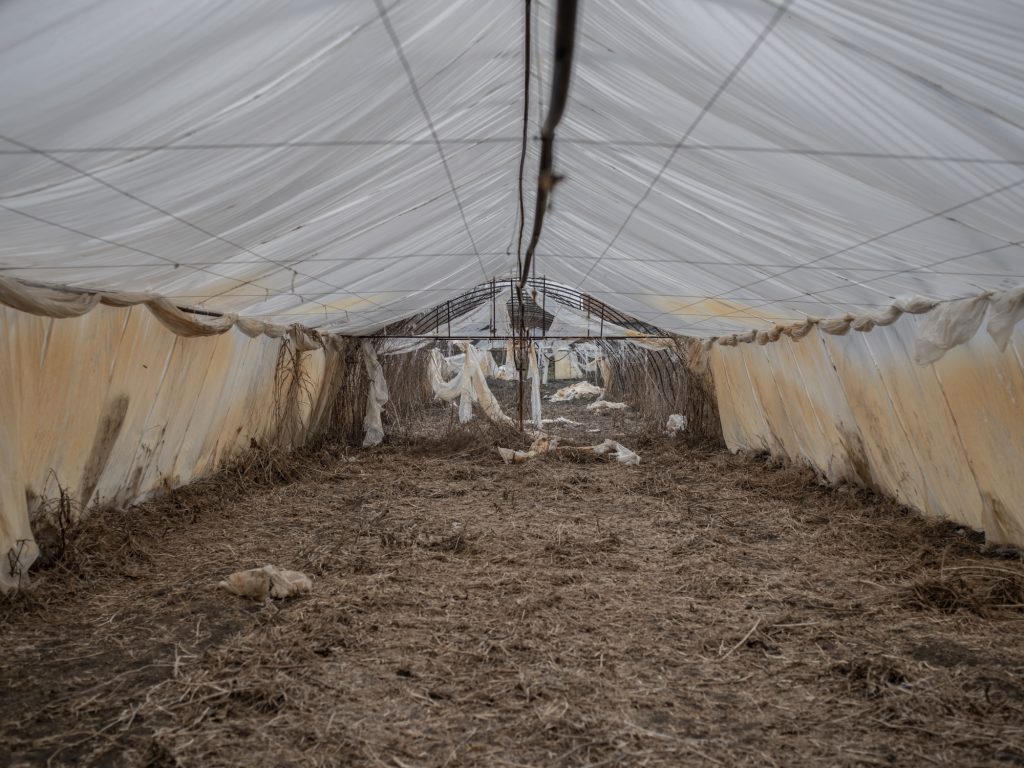
Csanytelek, 2020
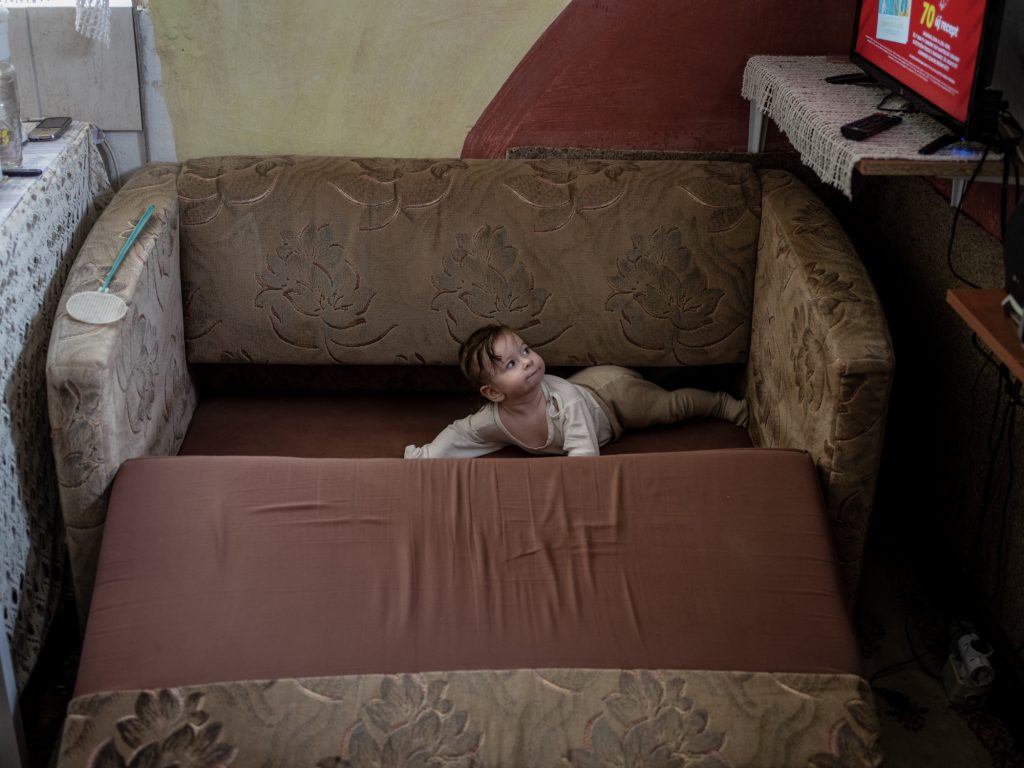
The seven-month-old Erika Patkó lies in her family's living room at their home in Tömörkény.
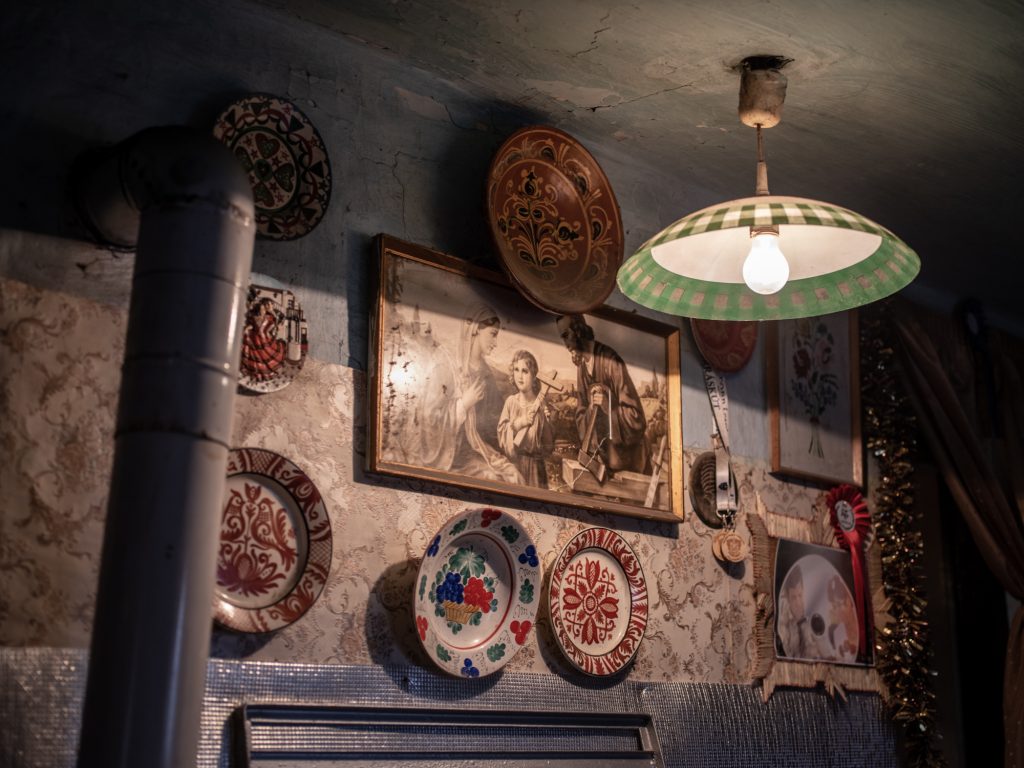
The wall of Vida family's’ living room in Tömörkény.
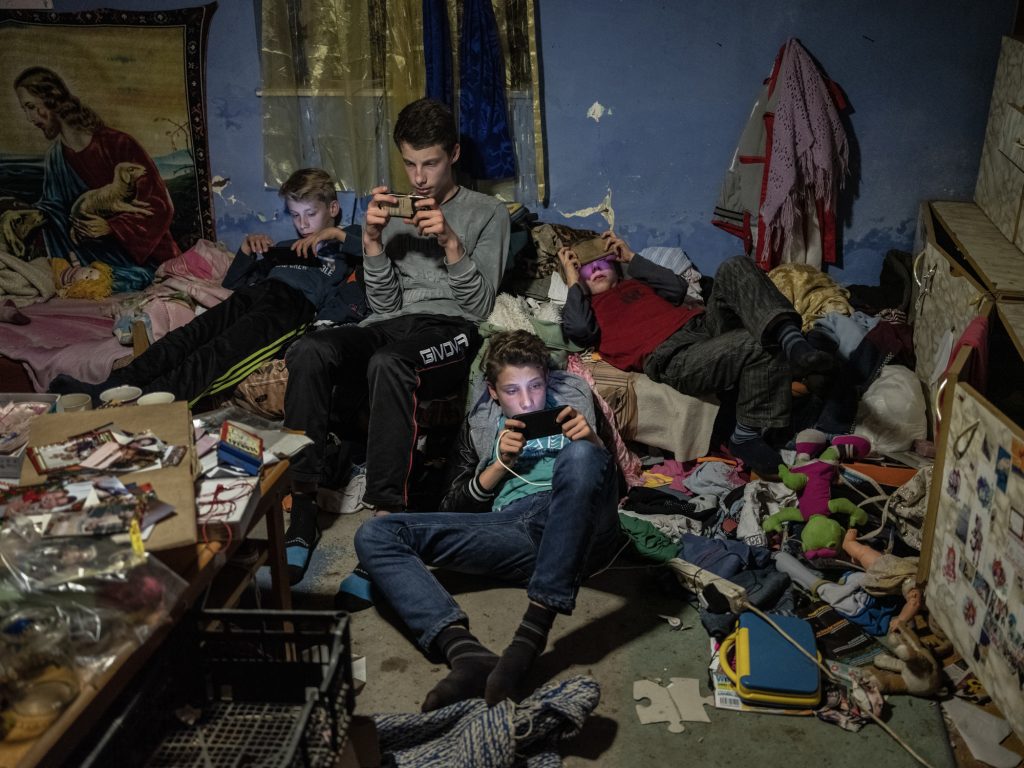
Social networking and the mobile phone are just as essential in the boys’ lives as in those of the most privileged ones.
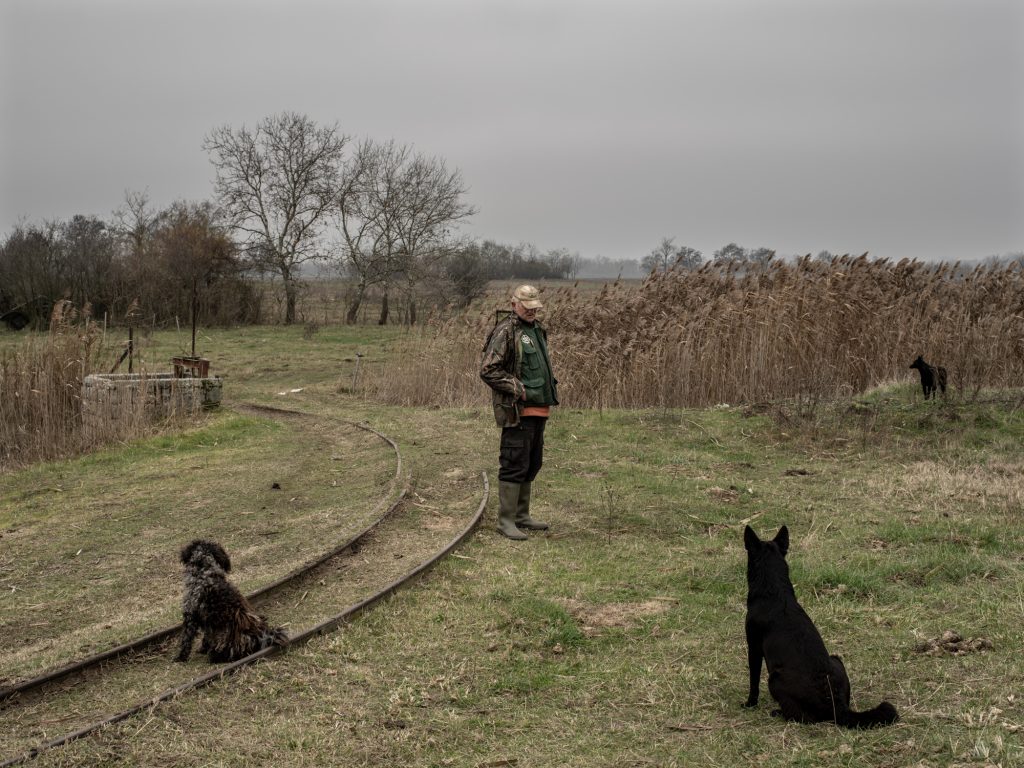
Ferenc Juhász shepherd standing along an abandoned railway-track near the fishing lake of Tömörkény.
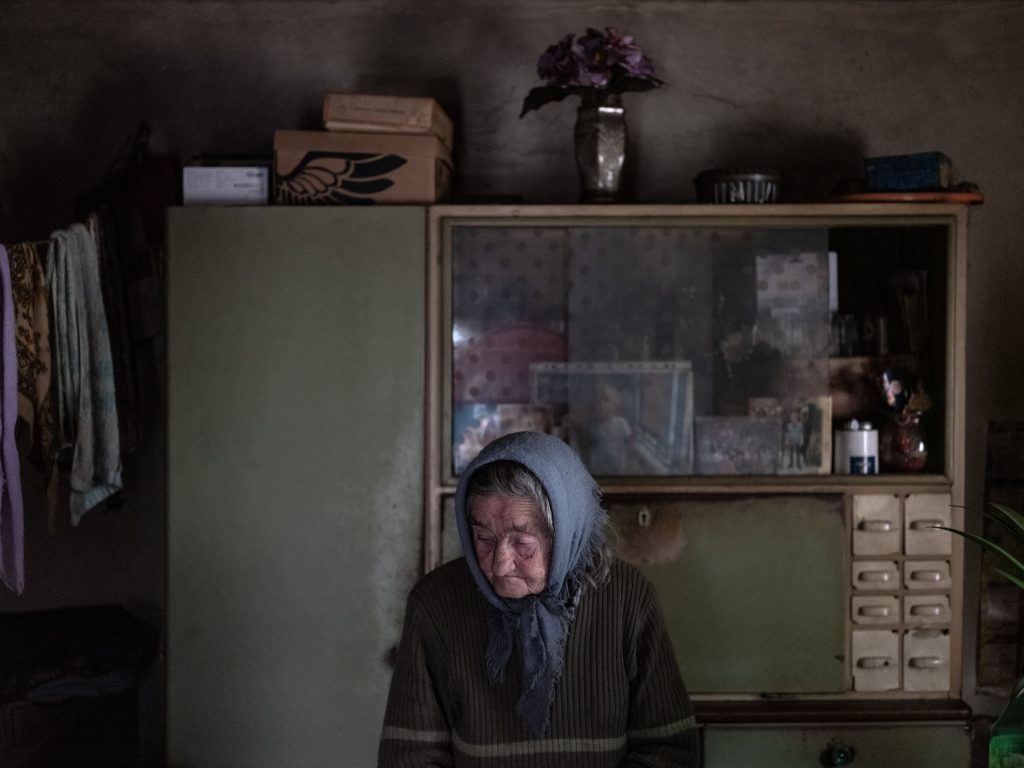
Anna Sebő, aged 86 has lived in her home of Csanytelek for 58 years. Her grandchildren moved abroad years ago. The majority of the youth move to nearby cities as soon as they can, resulting in a relatively high number of people living alone in Hungary.
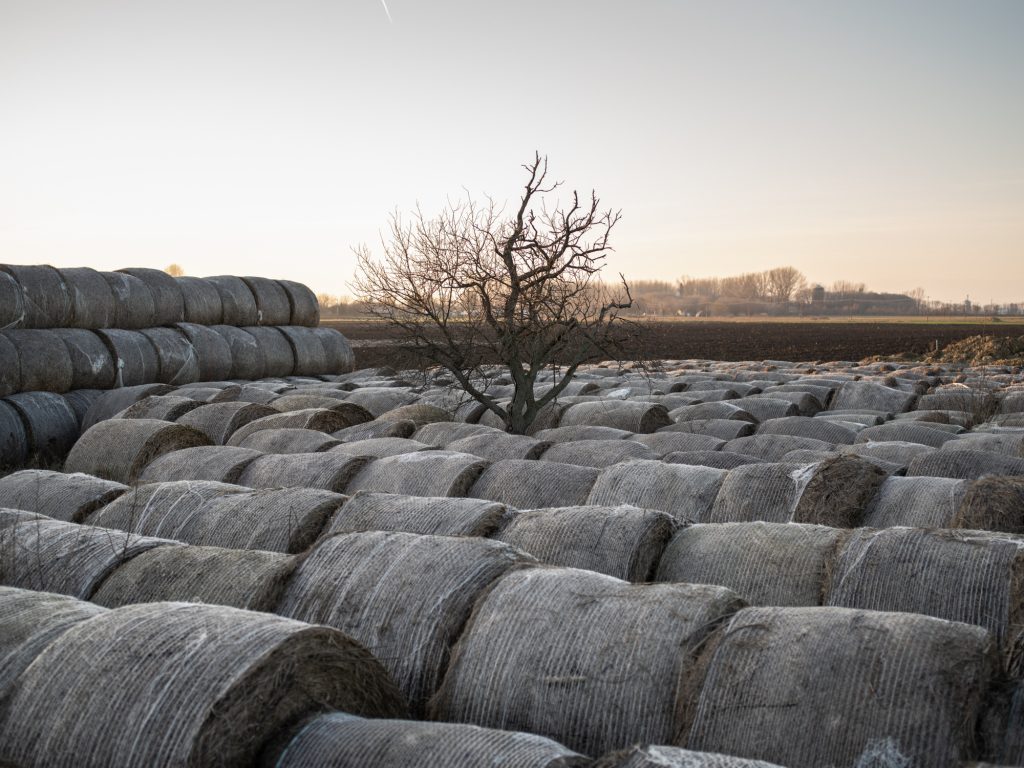
Hay bales rest in a field at the former Lenin settlement in Csanytelek.
Mud Country
”Mud Country” is a long-term photography project that aims to provide a personal perspective for the Hungarian dirt roads beside the spreading of poverty, the mass departure of people and the local everyday problems.
The number of dirt roads is amazingly high in Hungary. Many people live habitually and inevitably along dirt roads in the rural areas of Bács Kiskun, Békés and Csongrád counties. While in Western Europe 96 percent of public roads are paved, this ratio in Hungary is only 38 percent. The difference is even greater in rural areas.
The village of Csanytelek in Csongrád county is situated by the river Tisza. More than a third of the population lives along dirt roads. In rainy weather, the ground alongside the river becomes completely impassable. Years ago they spent 6500 Euros on the design, permits and application required for preparing the renovation of three dirt streets in particularly bad condition. The local government did not win the grant, because they failed to provide traffic count data and accident statistics to prove the need for a pavement. It is impossible to provide high traffic data to justify the necessity of renovating a road that is impassable during most of the year; nor do hay carts ever collide on a street where even jeeps get stuck. Just like in other settlements similar to Csanytelek, not only is it impossible for the ambulance to reach a patient with a heart attack within 15 minutes, it is virtually beyond any chance to find a tractor that could tow the ambulance to the patient.
Depopulated farmlands, emigration and the spreading of poverty also characterize “Mud Country”. Millions living in poverty, an extremely small middle class and more and more people who cannot provide for their family despite having a job – these are the features of Hungary. Almost a quarter of Hungarians are threatened by poverty or social exclusion. Hungary ranks in the lowest tier in all poverty dimensions among EU Member States, and this situation has not fundamentally changed over the past decade.
The “Mud Country” later on has also face the problems of the mass departure of people, which seriously affects rural villages. In Hungary already half of people between 19 and 30 would like to work abroad. A significant proportion of youth and middle-aged Hungarians desire to leave the country and have already started planning their emigration. Currently, more than 600,000 Hungarians live abroad in the European Union.
This is an ongoing project.
